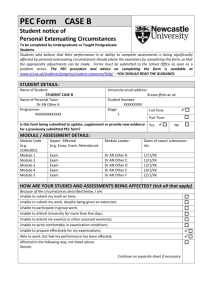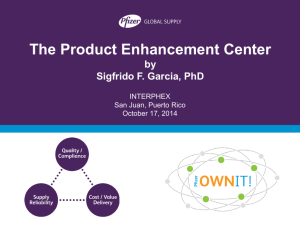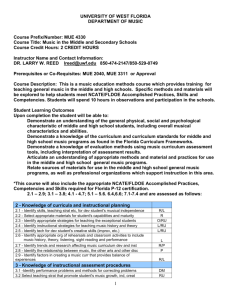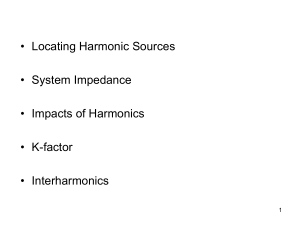Guidance notes on completing the PEC form.
advertisement
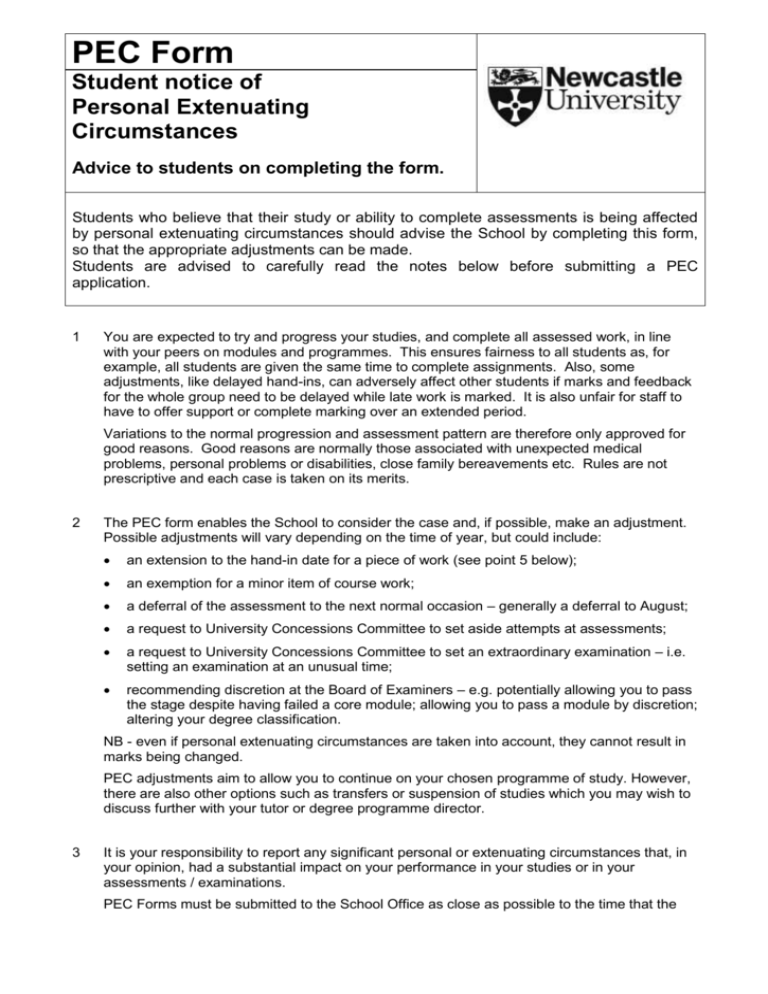
PEC Form Student notice of Personal Extenuating Circumstances Advice to students on completing the form. Students who believe that their study or ability to complete assessments is being affected by personal extenuating circumstances should advise the School by completing this form, so that the appropriate adjustments can be made. Students are advised to carefully read the notes below before submitting a PEC application. 1 You are expected to try and progress your studies, and complete all assessed work, in line with your peers on modules and programmes. This ensures fairness to all students as, for example, all students are given the same time to complete assignments. Also, some adjustments, like delayed hand-ins, can adversely affect other students if marks and feedback for the whole group need to be delayed while late work is marked. It is also unfair for staff to have to offer support or complete marking over an extended period. Variations to the normal progression and assessment pattern are therefore only approved for good reasons. Good reasons are normally those associated with unexpected medical problems, personal problems or disabilities, close family bereavements etc. Rules are not prescriptive and each case is taken on its merits. 2 The PEC form enables the School to consider the case and, if possible, make an adjustment. Possible adjustments will vary depending on the time of year, but could include: an extension to the hand-in date for a piece of work (see point 5 below); an exemption for a minor item of course work; a deferral of the assessment to the next normal occasion – generally a deferral to August; a request to University Concessions Committee to set aside attempts at assessments; a request to University Concessions Committee to set an extraordinary examination – i.e. setting an examination at an unusual time; recommending discretion at the Board of Examiners – e.g. potentially allowing you to pass the stage despite having failed a core module; allowing you to pass a module by discretion; altering your degree classification. NB - even if personal extenuating circumstances are taken into account, they cannot result in marks being changed. PEC adjustments aim to allow you to continue on your chosen programme of study. However, there are also other options such as transfers or suspension of studies which you may wish to discuss further with your tutor or degree programme director. 3 It is your responsibility to report any significant personal or extenuating circumstances that, in your opinion, had a substantial impact on your performance in your studies or in your assessments / examinations. PEC Forms must be submitted to the School Office as close as possible to the time that the problem arose. 4 5 6 You MUST fully complete the form – include all details asked including dates. If you do not fully complete the form, your PEC application may be rejected You must be specific about the problem, e.g. the unforeseen and unavoidable personal circumstances that significantly affected your performance. Be precise about how your work was affected – e.g. lack of time to complete the work, missed X hours in the laboratory, unable to revise, etc. The more detail you provide to indicate the severity and impact of the circumstances, the better. You must indicate how long the problems lasted. List all modules that have been adversely affected and be precise about what assessments were affected – e.g. 2nd essay, exam, lab report. You may also submit additional pages with your form if necessary. You may find it helpful to note the following: The more specific the problem, generally, the easier it is for the PEC Committee to support a case. The more independent third party evidence that there is to corroborate the problem and to date it, generally, the easier it is for the PEC Committee to support a case. It is very rare for a case to be approved without some form of independent evidence. The University expects students to cope with normal / minor life events without requiring adjustments. Some examples of normal / minor life events are colds and ‘flu’s, dental treatment, normal examination stress - even the death of an elderly or distant relative. The University is nevertheless mindful that each case varies and that various factors will apply. If you wish to base a PEC application around such matters you do need independent evidence AND to demonstrate how this had a significant impact on you. For example in the case of the death of an elderly relative: o see the evidence notes below, and: o you need to specify any special factors - had the relative acted as your parent or lived with your and your parents, was the death sudden and/or traumatic, did it occur just before your examinations, what was your role in funeral or other arrangements, how much time did you lose from study travelling and where was the funeral etc. If you have a disability that requires adjustments, you should have approached the Student Wellbeing Service. Adjustments may have been made throughout your studies – e.g. provision of scribes, extra time in examinations etc. The University would not therefore expect to receive a PEC in respect of your disability unless there has been some particular change in your condition – it is for you to demonstrate that and to provide the appropriate evidence. The University expects all students to plan their time effectively. It is expected that you will take data back-ups, that you will printout your assignment in good time etc. As a consequence, problems with computers, printers etc are not generally acceptable as grounds for a PEC. You MUST include any EVIDENCE with your form. It is your responsibility to provide evidence. Provide all evidence of the problems and the period of impact – e.g. doctor’s notes, a statement of support from your tutor, letter from your employer etc. It is recognised that this is not always possible, but you need to be aware that your request is more likely to be approved if evidence is available. Note the following important points about evidence. 7 A self-certification sick note is NOT strong enough evidence for a deferral of an examination or other significant adjustment. Depending on your case, a self-certification sick note may however be sufficient to warrant a short extension or other minor adjustment. In the event of bereavement, the University does not expect you to approach relatives for a copy of a death certificate. A variety of other evidence is possible – e.g. a letter from a relative; press cuttings or an obituary notice in the paper; order of service sheets. It may also be possible for your tutor to write a statement in support of the impact of the bereavement, although this will depend on whether you have developed a relationship with your tutor or approached your tutor at the time of the bereavement. Noting that each case varies, if you do not already have evidence in support of your claim you are generally advised NOT to seek to create evidence. For example: o If you did not visit the doctor at the time you had tonsillitis, it is no good seeing the doctor two weeks later if you are now well – the doctor’s statement will probably just say that you said you had tonsillitis, you may have to pay for the statement and the PEC Committee is unlikely to give strong weighting to the doctor’s statement. o If you have not approached Student Wellbeing Service throughout your studies about exam stress or low mood, they cannot provide you with a supportive statement just before your final examinations. If you are having a problem and are due to submit an assignment, so would like to apply for an extension, you MUST submit your PEC as soon as possible and BEFORE the hand-in date. Note the following information about extensions. 8 It is your responsibility to ensure that work is handed in on time. You are advised to ensure that work is handed-in (or at least ready to be handed-in) BEFORE the deadline. Last minute problems – e.g. with buses or printers – are not valid grounds for seeking an extension. Normally, the School can only grant extensions in line with University policy. This means that most extensions will be for short periods – generally a week or two. Extensions may be granted up to 2 weeks for undergraduate students and (exceptionally) up to 12 weeks for postgraduate taught students. The length of extension granted may vary depending on individual student circumstances. For dissertations, extensions of more than a week or two may require you to pay a fee to continue to use University facilities beyond the normal period of registration. Request extensions only for particular assignments where you genuinely need an extension and can justify it. Cases vary, but it is improbable that you would receive an extension for 4 assignments if you had flu for one week in the semester. You should be managing your time during the whole term so flu for one week just before the deadline should not affect all of your assignments. If you submit work late for the original deadline or the approved extension deadline, there is a penalty. If the work is up to 7 calendar days late the maximum mark that you get will be a pass mark (normally 40 for undergraduate and 50 for postgraduate students). If the work is more than 7 calendar days late it will be given a mark of 0. You are strongly encouraged to discuss significant personal circumstances with your personal tutor or other member of staff. Your tutor may be able to advise about how to phrase your application or whether alternate sources of help may apply. Also, your tutor may then be able to provide a statement of support, which will be taken in to account when your case is considered. NB: in some Schools there may be an expectation that a PEC application is less strong unless you advised your tutor of the problem at the time it was happening. Some Schools may also insist that you obtain your tutor’s signature before they accept the PEC form from you. (A print of an email confirmation will also be accepted as a ‘signature’. However, this does not apply in all cases and your PEC application will still be considered without input from your tutor if you have indicated that this is your preference. It may also be the case that the School may need to approach your tutor or another member of staff for clarification of details. NB: In particularly sensitive cases you may submit your PEC application in a sealed envelope marked ‘Strictly confidential – PEC application for the attention of the PEC Committee only’. 9 Each School will have a policy on how PEC applications are managed and any particular inclusions/exclusions that may apply. Refer to those procedures – ideally before submitting your PEC application. PEC requests should always be submitted to the school that runs your programme. If you study modules in different schools you should note that policies may vary between Schools. The School will log all PEC applications and the outcome. 10 No detailed feedback on any PEC application is given. You can however expect the School to inform you of any adjustment that has been approved. Until you receive such a confirmation your must attend classes and submit work as required. Generally, no individual feedback is provided on any submission to the full PEC Committee that meets before the Board of Examiners. 11 The Board of Examiners and its PEC Committee may only operate within University regulations. Key documents are: University regulations, particularly examination conventions – http://www.ncl.ac.uk/regulations/docs/ The University Policy on Late Submission of Assessed Work, effective from 2008/09 – http://www.ncl.ac.uk/aqss/qsh/index.php It may therefore be appropriate for the PEC Committee to refer a case to the University Concession Committee. This is the process by which the University considers personal circumstances which may warrant an adjustment outside the normal regulations. Such cases are considered at University level in order to ensure that students from across the whole University are accorded equal consideration. 12 In accordance with the Data Protection Act 1998 and University procedures, a PEC Committee (or a designated member of that Committee) will consider the form and evidence. This is a small sub-group of the Board of Examiners. No personal details – only summary recommendations – will be disclosed to the wider Board of Examiners. Summary information may also be made available to the Board of Examiners or other staff. 13 If you demonstrate a strong case, it is possible that one of the adjustments noted above can be made. However, even when the PEC Committee support your case, there is no guarantee that an adjustment is possible or that your overall result will be affected. Document prepared by the Student Progress Service: Version date - August 2010 For queries or comments, contact casework@ncl.ac.uk
